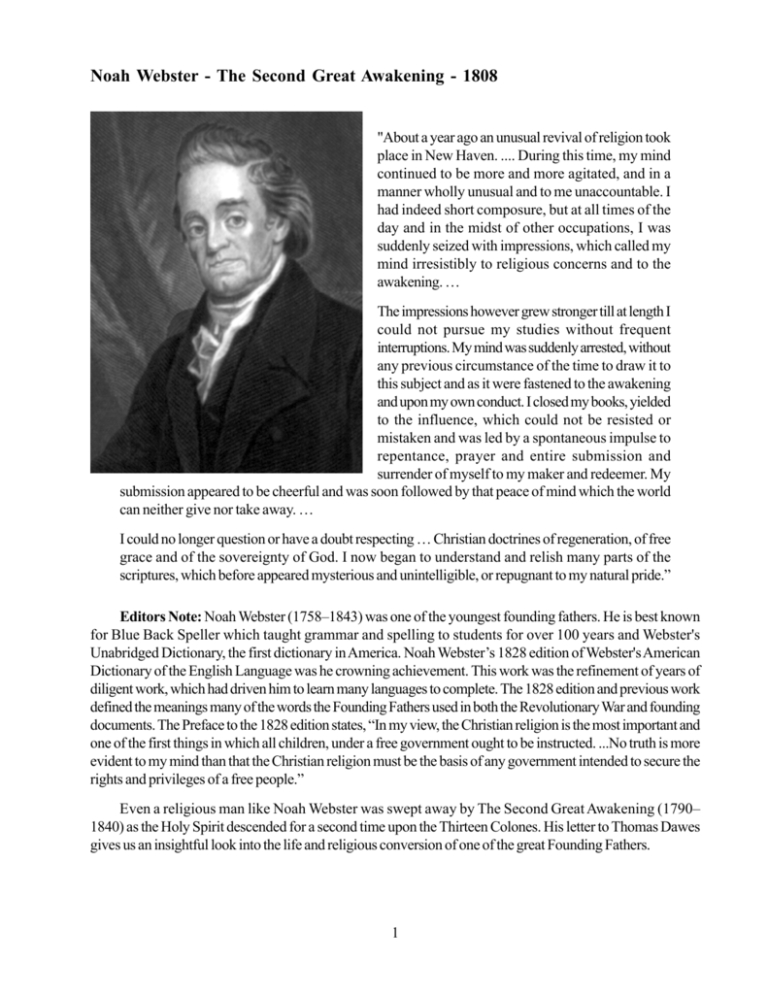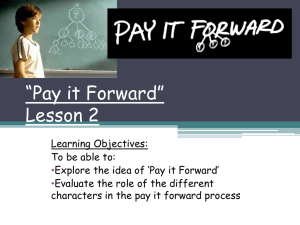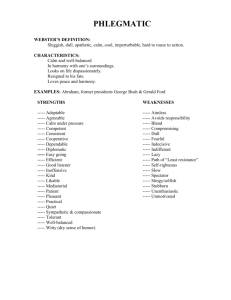
Noah Webster - The Second Great Awakening - 1808
"About a year ago an unusual revival of religion took
place in New Haven. .... During this time, my mind
continued to be more and more agitated, and in a
manner wholly unusual and to me unaccountable. I
had indeed short composure, but at all times of the
day and in the midst of other occupations, I was
suddenly seized with impressions, which called my
mind irresistibly to religious concerns and to the
awakening. …
The impressions however grew stronger till at length I
could not pursue my studies without frequent
interruptions. My mind was suddenly arrested, without
any previous circumstance of the time to draw it to
this subject and as it were fastened to the awakening
and upon my own conduct. I closed my books, yielded
to the influence, which could not be resisted or
mistaken and was led by a spontaneous impulse to
repentance, prayer and entire submission and
surrender of myself to my maker and redeemer. My
submission appeared to be cheerful and was soon followed by that peace of mind which the world
can neither give nor take away. …
I could no longer question or have a doubt respecting … Christian doctrines of regeneration, of free
grace and of the sovereignty of God. I now began to understand and relish many parts of the
scriptures, which before appeared mysterious and unintelligible, or repugnant to my natural pride.”
Editors Note: Noah Webster (1758–1843) was one of the youngest founding fathers. He is best known
for Blue Back Speller which taught grammar and spelling to students for over 100 years and Webster's
Unabridged Dictionary, the first dictionary in America. Noah Webster’s 1828 edition of Webster's American
Dictionary of the English Language was he crowning achievement. This work was the refinement of years of
diligent work, which had driven him to learn many languages to complete. The 1828 edition and previous work
defined the meanings many of the words the Founding Fathers used in both the Revolutionary War and founding
documents. The Preface to the 1828 edition states, “In my view, the Christian religion is the most important and
one of the first things in which all children, under a free government ought to be instructed. ...No truth is more
evident to my mind than that the Christian religion must be the basis of any government intended to secure the
rights and privileges of a free people.”
Even a religious man like Noah Webster was swept away by The Second Great Awakening (1790–
1840) as the Holy Spirit descended for a second time upon the Thirteen Colones. His letter to Thomas Dawes
gives us an insightful look into the life and religious conversion of one of the great Founding Fathers.
1
Letter to THOMAS DAWES, December 20, 1808
This candid avowal of your own opinions demands from me, a faithful and explicit exposition of my own,
and the reasons on which they are founded. Errors are always mischievous, but never so much so as in the
concerns of our immortal souls and in the relations which exist between God and ourselves.
Being educated in a religious family, under pious parents, I had, in early life some religious impressions,
but being too young to understand fully the doctrines of the Christian religion and falling into vicious company
at college, I lost those impressions and contracted a habit of using profane language. This habit however was
not of many years duration—profaneness appeared to me then as it now does, a vice without the apology
which some other vices find in human propensities, and as unworthy of a gentleman as it is improper for a
christian.
I rec’d my first degree in Sept. 1778, at a time when our country was impoverished by war, and when
few encouragements offered to induce young men to enter into professional employments. Having neither
property nor powerful friends to aid me, and being utterly unacquainted with the world, I knew not what
business to attempt nor by what way to obtain subsistence. Being set afloat in the world at the inexperienced
age of 20, without a father’s aid which had before supported me, my mind was embarrassed with solicitude,
and overwhelmed with gloomy apprehensions. In this situation I read Johnson’s Rambler, with unusual interest
and with a visible effect upon my moral opinions, for when I closed the last volume, I formed a firm resolution
to pursue a course of virtue through life, and to perform all moral and social duties with scrupulous exactness;
a resolution which I have endeavored to maintain, though doubtless not without many failures. I now perceive
that I ought to have read my Bible first, but I followed the common mode of reading, and fell into the common
mistake of attending to the duties which man owes to man, before I had learned the duties which we all owe to
our Creator and Redeemer.
For a number of years just past, I have been more and more impressed with the importance of regulating
my conduct by the precepts of Christianity. Of the being and attributes of God I have never entertained a
doubt, and my studies as well as frequent contemplations on the works of nature have led my mind to most
sublime views of his character and perfections. These views produced their natural effect of inspiring my mind
with the highest admiration and reverence, mingled with gratitude; and for some years past, I have rarely cast
my eyes to heaven or plucked the fruit of my garden without feeling emotions of gratitude and adoration.
Still I had doubts respecting some of the doctrines of the Christian faith, such as regeneration, election,
salvation by free grace, the atonement and the divinity of Christ; these doubts served as an apology for my
forbearing to make a profession of religion; for though I could never read or hear that solemn declaration of our
Savior, “whosoever shall confess me before men, him will I confess before my Father who is in heaven,”
without some compunction and alarm; yet I endeavored to justify my neglect by a persuasion that I could not
conscientiously assent to the usual confession of faith required in Calvinistic churches as the condition of
admission to their communion. That is in plain terms, I sheltered myself as well as I could from the attacks of
conscience for neglect of duty, under a species of scepticism and endeavored to satisfy my mind, that a
profession of religion is not absolutely necessary to salvation. In this state of mind I placed great reliance on
good works, or the performance of moral duties, as the means of salvation, although I cannot affirm that I
wholly abandoned all dependance on the merits of a Redeemer. You may easily suppose that in this state of
distraction, and indecision of opinions, I neglected many duties of piety.
About a year ago an unusual revival of religion took place in New Haven, and frequent conferences or
private meetings for religious purposes, were held by pious and well disposed persons in the Congregational
2
societies. I felt some opposition to these meetings, being apprehensive that they would by affecting the passions
too strongly, introduce an enthusiasm or fanaticism which might be considered as real religion. I expressed
these fears to some friends and particularly to my family, inculcating on them the importance of a rational
religion, and the danger of being misled by the passions.
My wife, however, was friendly to these meetings and she was joined by my two eldest daughters who
were among the first subjects of serious impressions. I did not forbid but rather discouraged their attendance
on conferences. Finding their feelings rather wounded by this opposition, and believing that I could not
conscientiously unite with them in a profession of the Calvinistic faith, I made some attempts to persuade them
to join me in attending the Episcopal service and ordinances. To this they were opposed. At some times I
almost determined to separate from my family, leaving them with the Congregational Society and joining myself
to the Episcopal. I went so far as to apply to a friend for a seat in the Episcopal Church but never availed myself
of his kindness in offering me one. In this situation my mind was extremely uneasy. A real desire of uniting myself
to some church by a profession of faith, a determination not to subscribe to all the articles of the Calvinistic
Creed, and an extreme reluctance against a separation from my dear family in public worship, filled my mind
with unusual solicitude. On examining the creeds of the two churches however, and the conditions of admission
to church communion, I found less difference than I had supposed, as to the essential doctrines of Christianity,
and in a conversation with Mr. Stewart, our pastor, some of my objections to our own confession of faith were
removed. During this time, my mind continued to be more and more agitated, and in a manner wholly unusual
and to me unaccountable. I had indeed short composure, but at all times of the day and in the midst of other
occupations, I was suddenly seized with impressions, which called my mind irresistibly to religious concerns
and to the awakening. These impressions induced a degree of remorse for my conduct, not of that distressing
kind which often attends convictions, but something which appeared to be reproof.
These impressions I attempted to remove by reasoning with myself, and endeavoring to quiet my mind,
by a persuasion, that my opposition to my family, and the awakening was not a real opposition to a rational
religion, but to enthusiasm or false religion. I continued some weeks in this situation, utterly unable to quiet
my own mind, and without resorting to the only source of peace and consolation. The impressions however
grew stronger till at length I could not pursue my studies without frequent interruptions. My mind was suddenly
arrested, without any previous circumstance of the time to draw it to this subject and as it were fastened to the
awakening and upon my own conduct. I closed my books, yielded to the influence, which could not be resisted
or mistaken and was led by a spontaneous impulse to repentance, prayer and entire submission and surrender
of myself to my maker and redeemer. My submission appeared to be cheerful and was soon followed by that
peace of mind which the world can neither give nor take away.
This my dear friend, is a short but faithful narration of facts. That these impressions were not the effect of
any of my own passions, nor of enthusiasm is to me evident, for I was in complete possession of all my rational
powers, and that the influence was supernatural, is evident from this circumstance; it was not only independent
of all volition but opposed to it. You will readily suppose that after such evidence of the direct operation of the
divine spirit upon the human heart, I could no longer question or have a doubt respecting the Calvinistic and
Christian doctrines of regeneration, of free grace and of the sovereignty of God. I now began to understand
and relish many parts of the scriptures, which before appeared mysterious and unintelligible, or repugnant to
my natural pride. For instance, I was remarkably struck with the 26th verse of John, 14th, ‘But the Comforter
which is the Holy Ghost, whom the Father will send in my name, he shall teach you all things, and bring all
things to your remembrance, whatsoever I have said to you’’—a passage which I had often read without
realising its import—in short my view of the scriptures, of religion, of the whole christian, scheme of salvation,
and of God’s moral government, are very much changed, and my heart yields with delight and confidence to
whatever appears to be the divine will.
3
Permit me here to remark in allusion to a passage in your letter, that I had for almost fifty years, exercised
my talents such as they are, to obtain knowledge and to abide by its dictates, but without arriving at the truth,
or what now appears to me to be the truth of the gospel. I am taught now the utter insufficiency of our own
powers to effect a change of the heart and am persuaded that a reliance on our own talents or powers, is a fatal
error, springing from natural pride and opposition to God, by which multitudes of men, especially of the more
intelligent and moral part of society are deluded into ruin. I now look, my dear friend, with regret on the largest
portion of the ordinary life of man, spent ‘without hope, and without God in the world.’ I am particularly
affected by a sense of my ingratitude to that Being who made me, and without whose constant agency, I cannot
draw a breath, who has showered upon me a profusion of temporal blessings and provided a Savior for my
immortal soul. To have so long neglected the duties of piety to that Being on whom I am entirely dependent, to
love whom supremely is the first duty, as well as highest happiness of rational souls, proves a degree of
baseness in my heart on which I cannot reflect without the deepest contrition and remorse. And I cannot think
without trembling on what my condition would have been had God withdrawn the blessed influences of his
spirit, the moment I manifested opposition to it, as he justly might have done, and given me over to hardness of
heart and blindness of mind. I now see in full evidence, the enormous crime, the greatest, man can commit
against his God, of resisting the influence of his holy Spirit. Every sting of conscience must be considered as a
direct call from God to obey his commands; how much more then ought man to yield to those pungent and
powerful convictions of sin which are unequivocally sent to chastize his disobedience and compel him to return
to his Heavenly Father.
In the month of April last I made a profession of faith; in this most solemn and affecting of all transactions
of my life, I was accompanied with my two eldest daughters; J while I felt a degree of compunction that I had
not sooner dedicated myself to God, it was with heartfelt delight, I could present myself before my Maker, and
say ‘ Here am I, with the children which thou hast given me.’
Mrs. W. was confined at the time and could not be a witness of this scene, so interesting to her, as well as
to us who were personally concerned, but you may easily conceive how much she was affected, the first time
she met her husband and children at the Communion.
I have now, my dear Sir, given you a brief narrative of the facts which were the subject of your kind
enquiries. I may perhaps in a future letter offer you my opinions on some doctrines of my religious faith; but I
am not confident of the propriety of what may be deemed an obtrusion. Of your benevolence, sincerity and
affection for me, I have had sufficient proof and my heart reciprocates all your kind wishes for my welfare. I
have long been accustomed to consider you as the best of men, and if we have not corresponding views of
Christian principles, my friendship for you will remain undiminished. Accept my sincerest love and that of my
wife and daughters for youcself and Sister D. and all the family. From your affectionate brother.1
Endnotes:
1. Ford, Bartleby, Emily Ellsworth Fowler, Notes on the Life of Noah Webster, Page 42-49; Privately Printed,
New York, New York, 1912.
Photo, courtesy of the Library of Congress, http://lcweb2.loc.gov
——————————————————————————
When a people lose their history, they lose a part of who they are.
Reclaim your heritage, pass this on to a friend or family member.
——————————————————————————
4
www.GodTheOriginalIntent.com
Copyright © 2009 Michael A. Shea - All Rights Reserved
106-09
5







